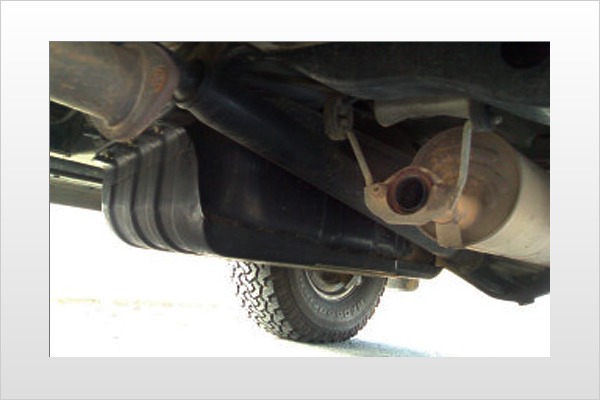
You walk out to your car and it's gone. Not your car itself, the navigation system or even your cell phone. The "it" is your catalytic converter. If you don't happen to notice it right away, the moment you start your car, you will. The sound has been described as "a deep loud noise," "an unmistakable roar," and even like "a Harley Davidson."
Dan McColl of Upland, California, remembers when it happened to him.
"When I got out of the gym, I started up my truck and it sounded like there was a hot rod in the parking lot," said McColl. "In fact, I didn't even think it was my truck at first. But when I cut the engine and it stopped, I knew that it was me. I was able to drive it, but it was like the gas wasn't really engaging. I drove it to the mechanic and he was able to tell me right away that the catalytic converter had been stolen."
The catalytic converter was mandated for all U.S. cars and trucks in 1975, to convert harmful pollutants into less harmful emissions before they left the exhaust system. Precious metals such as platinum, palladium, rhodium or gold are used as the catalyst. Depending on which metal was used, thieves can sell the converters to metal recyclers for $20-$200. The recyclers then extract the metal and resell it for as much as $6,000 an ounce, as in the case of rhodium. While national theft figures are not recorded for catalytic converter theft, the crime has risen in tandem with sharply rising metal prices.
The unfortunate vehicle owner will have to pay $1,000 or more for a replacement converter to be installed, depending on parts and labor charges. If the thief damages the vehicle's wiring or fuel line in the process, the vehicle could be left in a dangerous state and cost far more to repair. If the thief steals your converter without causing additional damage, you should still be able to drive your vehicle, but you'll need to install a replacement converter as soon as possible if the law still requires one. Ironically, during the writing of this article, a catalytic converter was stolen from a Toyota truck belonging to the brother-in-law of Edmunds.com Director of Vehicle Testing Dan Edmunds. The quote to replace it was $1,200, but because there is no smog testing program in the rural county in which he lives, he's not sure he'll replace it.
Thieves can remove a catalytic converter quickly, often in less than two minutes, so theft can even occur in broad daylight. The only tools a thief needs are a wrench (for converters that are bolted on) or a reciprocating saw (for converters that are welded in). Some thieves bring a mechanic's creeper. Then all they do is slide under the vehicle, remove the bolts holding the converter, and take it. Thieves can remove the unit within a minute or two.
Typically, catalytic converters are stolen from cars and trucks in driveways, strip malls or in parking garages. "Anywhere cars are exposed," says Detective Abram Yap of the Long Beach Police Department.
The most commonly hit vehicles are SUVs and trucks, especially late-model Toyotas, because they sit higher off the ground (making for easier access) and the bolts that connect the converter are easily removed. Yap says his department has been seeing more Nissans targeted as well.
Rudy Espinoza, wholesale parts manager for Surf City Nissan in Huntington Beach, agrees, noting an uptick in requests from owners of older-model Nissan Frontiers. "It's crazy," he says. "We get calls, "How much is a catalytic converter? Mine was stolen!"
There are a few options that may help prevent this type of theft. Some mechanics suggest welding the heads on the catalytic converter bolts — or simply shearing them off.
The aftermarket has responded by designing products to deter and prevent catalytic converter theft. The idea behind such devices is that if it takes too long to make the steal, the thieves will move on to easier pickings. The CatClamp, for example, which starts at $150, is a hard-to-defeat cage installed around the catalytic converter. This product can be installed by a mechanic or at home with an included specialized tool and is backed by a money-back guarantee.
While most owners don't give much thought to their catalytic converter, those with vehicles high off the ground might want to think twice. It's always wiser to park in well-lit or protected public parking lots, and to park your car in your home garage if possible. Owners whose vehicles have easy clearance underneath might want to take it a step further with an aftermarket product. Taking these precautionary measures will hopefully deter thieves and keep your car running smoothly.
Disclosure: Detective Abram Yap is the author's husband and helped contribute to this story.